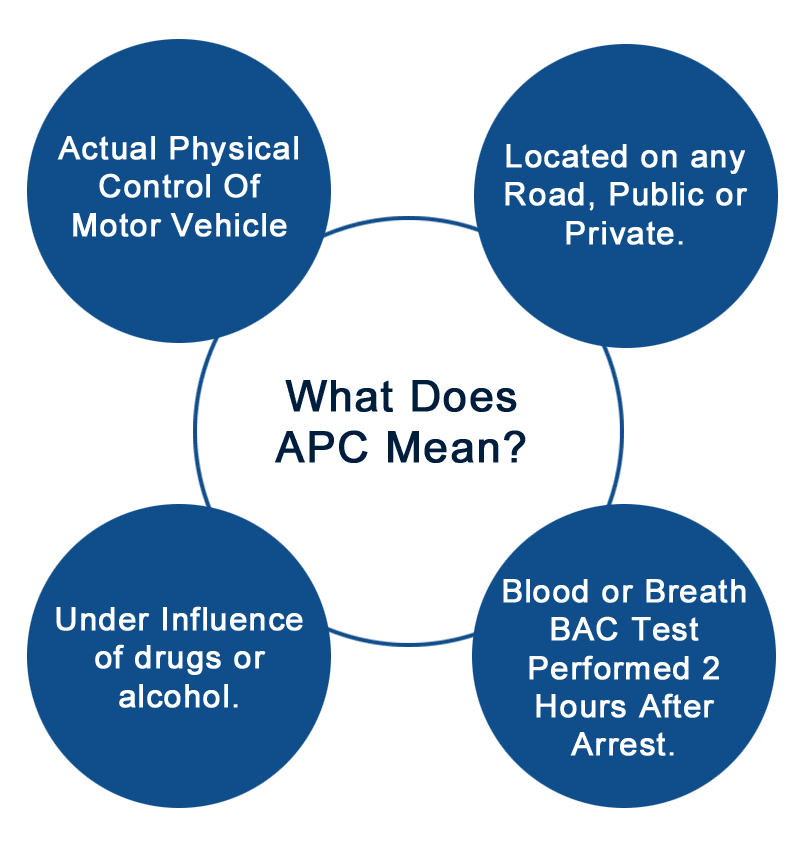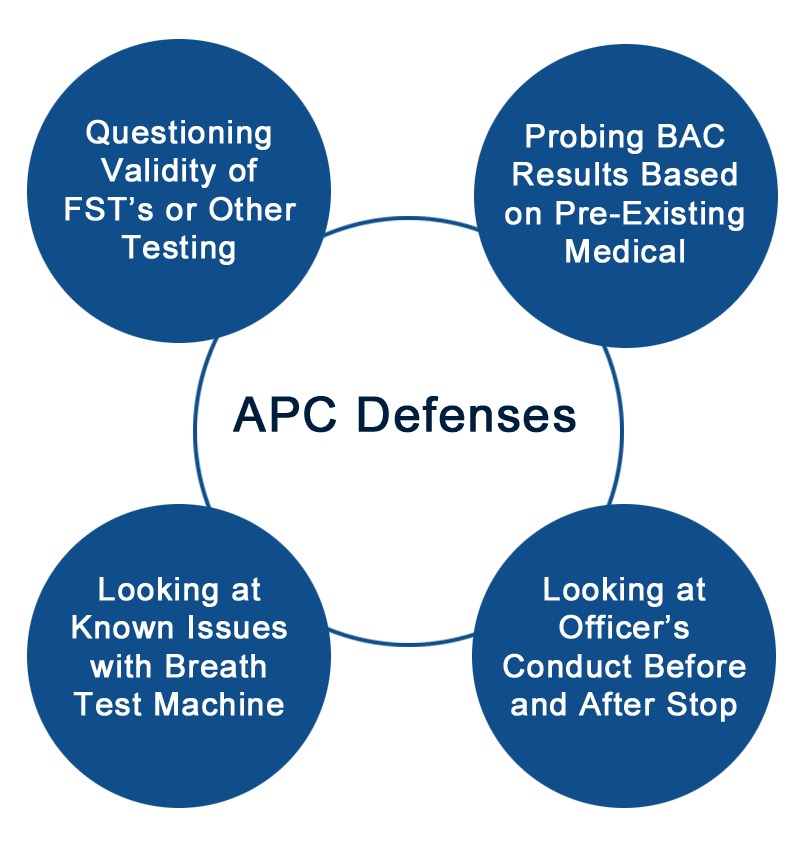Actual Physical Control in Oklahoma
Sometimes even doing what may seem like the right thing can get you in trouble. Let’s say you’ve been out for a night on the town with friends. Maybe you had a few drinks along the way, and as you get to your vehicle you decide you’re not in any state to drive. Being the responsible citizen you are, you choose to sleep it off in your vehicle and get yourself home in the morning when you’ve sobered up.
It seems like you’ve done the right thing, but in the state of Oklahoma, you are committing the crime of Actual Physical Control (APC). And myriad situations could lead to an APC charge. You might be found behind the wheel in a parking lot with a Blood Alcohol Content (BAC) above .08; even if you weren’t driving you could still be charged with APC. You can even be charged with APC parked in front of your house with no intention of operating the car.
While legally distinct from a DUI, Actual Physical Control occurs when you register a BAC of .08 or higher and are in charge of the vehicle. And while you may not be driving the car at the time of your arrest, an APC charge carries the same penalties as DUI. You can face jail time and a subsequent criminal record that could affect your ability to secure employment, a student loan, or secure custody of children. In addition, you can expect steep fines as well as court costs, and higher car insurance premiums. Beyond that, you might even face probation or installation of an ignition interlock device on your car.
 What does Actual Physical Control mean?
What does Actual Physical Control mean?
To prove a charge of APC, the state must establish four key points:
- You were actually in physical control of the motor vehicle. While not actively operating the vehicle at the time of the arrest, if the keys were near you or on your person, that will be enough to satisfy this requirement.
- You were located on any kind of road, public or private, that accesses a single- or multi-family unit dwelling. This can also pertain to driveways, parking lots, or garages.
- You were found to be under the influence of an intoxicant, whether drugs or alcohol. This can be determined through field sobriety tests, on-scene observations by the arresting officer, or by a breathalyzer test showing a BAC of .08 or higher.
- That any test of BAC, through blood or breath, was administered within a two-hour window following the arrest.
To secure a conviction, the state must show that all of these requirements were met and that you were found to be under the influence and could operate the vehicle, regardless of your intentions.
What is the Reason for APC Versus DUI in Oklahoma?
On the one hand, APC may seem like a “no harm, no foul” situation. As you weren’t physically operating the vehicle, there’s no danger to other motorists or pedestrians, right? Be that as it may, APC was introduced to Oklahoma law to keep that from happening. Rather than encourage drivers to “sleep it off” in their car, only to wake up and drive while still intoxicated, APC was introduced for public safety.
Essentially, APC gives law enforcement the ability to charge you before you have a chance to get out on the road and be charged with DUI. And while the charges for DUI occur after you have started the car, you can expect the same consequences.
There Are Two Cases Against you for Actual Physical Control
As with a DUI, a charge of APC in the state of Oklahoma comes with two completely separate actions against you. The first element you will face is a criminal charge, with punishments ranging from fines to jail time if the prosecution can prove your guilt beyond a reasonable doubt in court. First offense APC is considered a misdemeanor. Second offense APC can be charged as a felony.
Lookback Period for APC in Oklahoma
First- and second-offense APC will be determined based on a 10-year lookback period. Essentially, if you have a prior conviction for DUI or APC in the state of Oklahoma within the last 10 years, this charge will be considered a second offense.
The second element of an APC charge is actions taken against your driving privileges. Leveled at you by the Oklahoma Department of Public Safety, these actions are separate from the criminal charges and will seek a suspension of your driver’s license.
Fighting this second action must be done swiftly by challenging an appeal in District Court within 30 days of the arrest. Failing to respond within that window will lead to the suspension of your driver’s license. The alternative is requesting admission to the Impaired Driver Accountability Program (IDAP). We always suggest challenging the suspension first.
What are the Consequences for First-Offense APC in Oklahoma?
Circumstances vary, but generally, you can expect the possibility of a jail sentence between 10 days and a year, plus fines up to $1,000 and beyond. If you fail to appeal your license suspension, you can expect to lose privileges for six months.
On top of that, you may also be required to complete community services, and will most likely have to undergo an alcohol and drug abuse evaluation and assessment program and attend DUI School. If you elect to enroll in the IDAP Program, you will likely attend a victim impact panel and have an ignition interlock device installed in your vehicle for 180 days.
Consequences for a second offense grow even steeper, opening the possibility of a jail sentence of 1-5 years, fines up to $2,500, and a one-year suspension of your license. Third and subsequent offenses open you up to the possibility of up to 10 years in prison, a $5,000 fine, and an eight-year license suspension.
 What Are the Defenses in an Actual Physical Control Case?
What Are the Defenses in an Actual Physical Control Case?
The first order of business in defending you against charges of APC is to weaken the case against you. The state needs to prove beyond a reasonable doubt that you were in control of the vehicle and were impaired. There are numerous methods of casting doubt on these claims, including:
- Questioning the validity of the field sobriety exercises or testing procedures of your blood and breath.
- Probing the BAC results based on pre-existing medical conditions, complications with prescription drugs, or improper chain-of-custody handling of evidence.
- Examining known issues with the equipment used to test your breath.
- Taking a closer look at the officer’s conduct before and after the stop, looking for procedural mistakes caused by lack of training.
The list goes on and on. These are just a few examples.
How We Can Help
The Edge Law Firm has a proven track record of favorable outcomes in APC cases because we dig deeper and do more to learn about your case before we even begin. This thorough preparation, keying in on even the most minute details, leaves us better prepared to defend you and gives you a clearer picture of your rights. Then when it’s time to get your life back on track, you can proceed with confidence in our trial-tested methods.
It all starts with a free, no-obligation review of your case. The moment you choose Edge Law Firm you immediately see the difference as our tireless investigators pick through your case from top to bottom, gathering witness testimony and evidence, reviewing every word of the police reports and every scrap of evidence from test results to body cam footage. What we’re looking for are the routine mistakes that law enforcement makes which can have a giant impact on your case.
With this depth of knowledge in hand, we can evaluate motions to dismiss your case, exclude evidence, or other ways to best protect you. With this preparation, we are fully ready to take your case to trial to pursue a win on your behalf.
There are infinite ways and options available to you. Sleep better tonight by scheduling yourself a free, no-obligation case evaluation with the attorneys at Edge Law Firm.
Please submit our secure contact form below:
